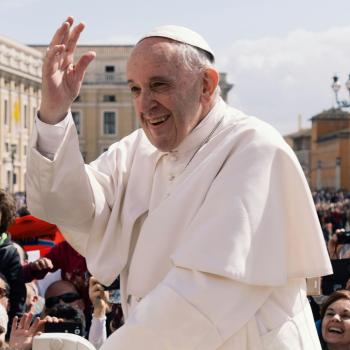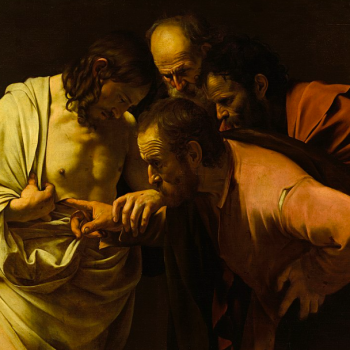Lectionary Reflections
Luke 9:28-36
February 10, 2013
The Transfiguration is a story with six characters, but none we can, or probably want to, identify with fully. Picture the scene with me as if it were a kind of still life, like a crèche set up before your eyes. Here is Jesus, dazzling with the presence of God, and two prophets long-dead talking to him. Here are three disciples emitting a buzzing snoring sound.
Show me one of them we can fully identify with! Jesus is the Son of God, and we wouldn't want to be presumptuous and think we could ever be all that he is. Moses spoke to God face-to-face, and Elijah, instead of being buried in the dirt, was taken up to heaven in a chariot of fire. The disciples, busy snoring, are frankly, too human for my taste. I don't want to be like them.
But don't walk out on the Transfiguration at the intermission. God promises us that through Scripture we will meet God, and our identities as individuals and a community of faith will be formed and transformed. Surely there is someone here who is both like us and someone we desire to be like.
Finding a Character We Can Relate to
Circle the scene with me. Let's start with Jesus. Of course, we can't presume to fully identify with Jesus the Son of God, God's Chosen. But there is something Jesus and we have in common: our humanity. As a human being, Jesus was probably very tired. That's usually when he tried to get away, to go into the hills for a prayer break, to get a mountaintop perspective. As a human being, perhaps he was wondering how effective his ministry had been to date.
From the mountaintop looking over the land of Galilee, if he squinted, perhaps he could make out the figure of the little girl he had raised from the dead a few days before (Lk. 8:49f). She was playing in the courtyard in front of her house. Perhaps he could see Herod, pacing back and forth on his roof, shaking his fist at the air saying, "I got rid of John! Now who is this new nuisance, Jesus?" (Lk. 9:7-9). Perhaps Jesus could see a crowd gathering on one side of the mountain asking one another, "Where did that miracle worker go with his loaves and fishes? We are hungry again!" Perhaps on the other side of the mountain he could see another crowd gathering, in their midst a young boy having a seizure, foaming at the mouth and shrieking, while the people ask, "Where is that healer?"
If you know what it is like to be tired, to be misunderstood, to have people seeking you out for what you can do for them, and other people criticizing you and working against you, you have a little something in common with Jesus. And if you have ever been filled with dread at what lies ahead, you have a little something in common with Jesus.
He had come up here to be alone, but once on the mountain, deep in prayer, here comes company—Moses and Elijah! The Hebrews themselves believed that any new Messiah that came would have to be in the mold of these two. Moses, the greatest prophet Israel had ever known, set the standard for any Messiah who would come in the future. Moses led the people in an Exodus from Egypt across the Red Sea to the wilderness. Moses had seen God face-to-face on Mt. Sinai, the Mount of Revelation, and his face had shone (Ex. 34:29-35). How could we possibly identify with him?
Of course, on the human side, we remember that Moses hadn't wanted to be a prophet in the first place and had made excuses to God to get out of it. (If you know what it's like to make excuses to God, you have a little something in common with Moses.) He had given in to the people, when he just couldn't stand their murmuring and complaining and rebelling another second.
If you have ever compromised your faith convictions for popular opinion, you have a little something in common with Moses. When God took him to the top of Mt. Nebo to survey the Promised Land, he couldn't enter into it. If you have ever felt the pain of separation from God because of your actions, you have a little something in common with Moses. Fearful, making mistakes, yet all in all a great prophet and servant—maybe there is something there for us! Though we are excuse-making, soft-spined servants, we have still been chosen and called to leadership. We have a lot in common with Moses. Moses knew about suffering and he knew about glory and he came back to point Jesus toward the glory.
But what about Elijah, this fearless prophet who, rather than dying like the rest of us, was taken up into heaven in a chariot of fire (2 Kgs. 6:17)? I am intimidated when I think about identifying with him! Of course, he was the same prophet who, when he found out Queen Jezebel's forces were out to kill him, ran scared, hid out in the hills, and—sitting under a broom tree—begged pathetically for God to take his life (1 Kgs. 18,19). Any of us who have ever said to God, "This is the end of the line. I didn't sign on for this" have a little something in common with Elijah. From begging for death under a broom tree to being taken up to heaven in a chariot of fire, Elijah knew suffering and glory. He had come back to talk to Jesus about the glory. Many people in Jesus' time expected that Elijah would return to signal the coming of the Messiah. And sure enough, on this mountain, he had.





